University Ethics Essay: Act Utilitarianism & Kant's Duty Ethics
VerifiedAdded on 2022/09/17
|7
|1855
|30
Essay
AI Summary
This essay delves into the realm of ethics, examining the moral principles that govern individual behavior and decision-making processes. It presents a case study involving a community development worker facing an ethical dilemma in a remote indigenous community. The core of the essay revolves around the application of two key ethical theories: Act Utilitarianism and Kant's Duty Ethics. Act Utilitarianism is explored as a theory that justifies actions based on their ability to produce the best possible outcomes, while Kant's Duty Ethics emphasizes the importance of fulfilling one's moral duties regardless of consequences. The essay analyzes the case through the lenses of these theories, arguing that in this scenario, breaking professional rules to build trust within the community aligns with both ethical frameworks. The discussion includes criticisms of each theory and concludes that, in this specific context, pro-social rule-breaking is the ethically sound approach.
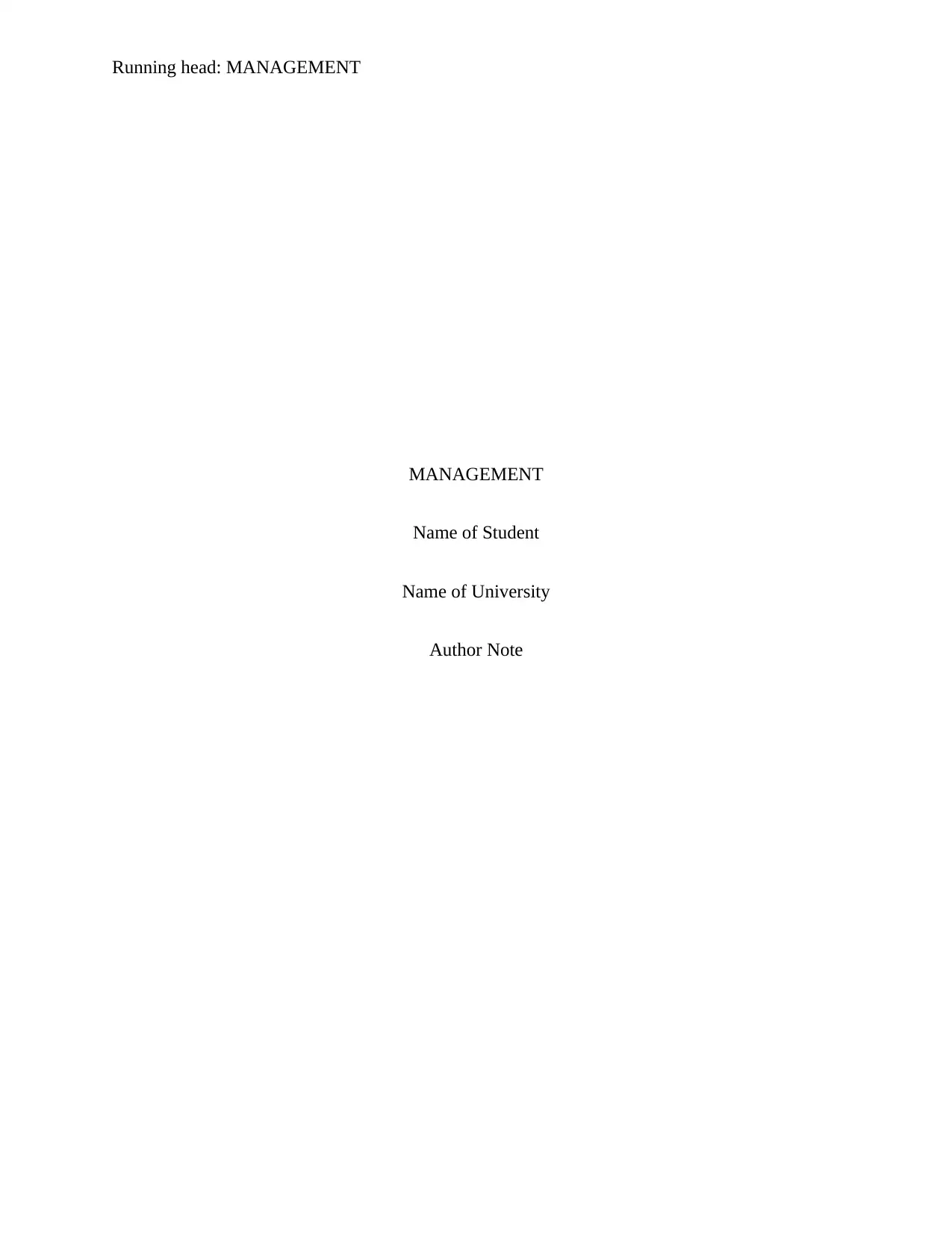
Running head: MANAGEMENT
MANAGEMENT
Name of Student
Name of University
Author Note
MANAGEMENT
Name of Student
Name of University
Author Note
Paraphrase This Document
Need a fresh take? Get an instant paraphrase of this document with our AI Paraphraser
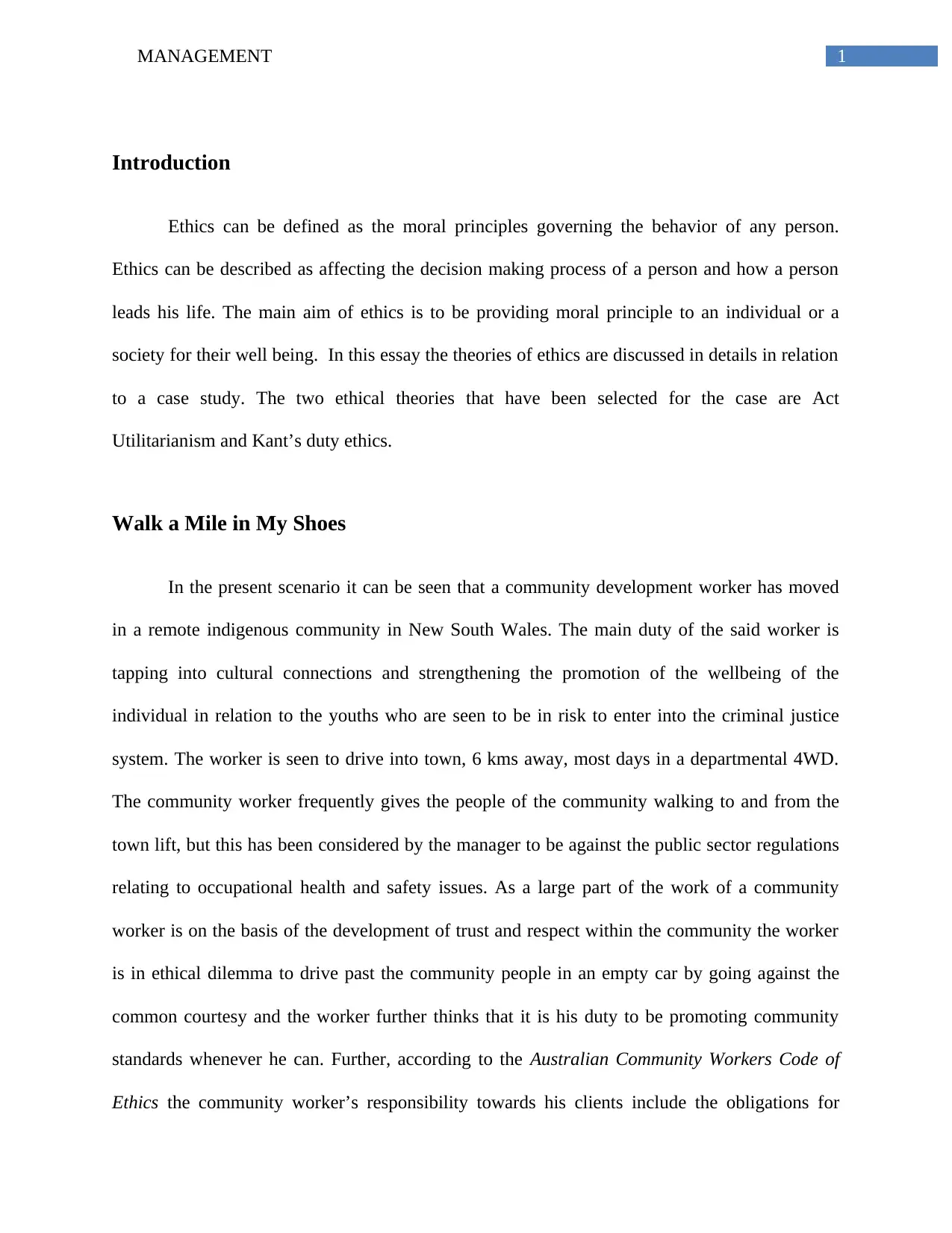
1MANAGEMENT
Introduction
Ethics can be defined as the moral principles governing the behavior of any person.
Ethics can be described as affecting the decision making process of a person and how a person
leads his life. The main aim of ethics is to be providing moral principle to an individual or a
society for their well being. In this essay the theories of ethics are discussed in details in relation
to a case study. The two ethical theories that have been selected for the case are Act
Utilitarianism and Kant’s duty ethics.
Walk a Mile in My Shoes
In the present scenario it can be seen that a community development worker has moved
in a remote indigenous community in New South Wales. The main duty of the said worker is
tapping into cultural connections and strengthening the promotion of the wellbeing of the
individual in relation to the youths who are seen to be in risk to enter into the criminal justice
system. The worker is seen to drive into town, 6 kms away, most days in a departmental 4WD.
The community worker frequently gives the people of the community walking to and from the
town lift, but this has been considered by the manager to be against the public sector regulations
relating to occupational health and safety issues. As a large part of the work of a community
worker is on the basis of the development of trust and respect within the community the worker
is in ethical dilemma to drive past the community people in an empty car by going against the
common courtesy and the worker further thinks that it is his duty to be promoting community
standards whenever he can. Further, according to the Australian Community Workers Code of
Ethics the community worker’s responsibility towards his clients include the obligations for
Introduction
Ethics can be defined as the moral principles governing the behavior of any person.
Ethics can be described as affecting the decision making process of a person and how a person
leads his life. The main aim of ethics is to be providing moral principle to an individual or a
society for their well being. In this essay the theories of ethics are discussed in details in relation
to a case study. The two ethical theories that have been selected for the case are Act
Utilitarianism and Kant’s duty ethics.
Walk a Mile in My Shoes
In the present scenario it can be seen that a community development worker has moved
in a remote indigenous community in New South Wales. The main duty of the said worker is
tapping into cultural connections and strengthening the promotion of the wellbeing of the
individual in relation to the youths who are seen to be in risk to enter into the criminal justice
system. The worker is seen to drive into town, 6 kms away, most days in a departmental 4WD.
The community worker frequently gives the people of the community walking to and from the
town lift, but this has been considered by the manager to be against the public sector regulations
relating to occupational health and safety issues. As a large part of the work of a community
worker is on the basis of the development of trust and respect within the community the worker
is in ethical dilemma to drive past the community people in an empty car by going against the
common courtesy and the worker further thinks that it is his duty to be promoting community
standards whenever he can. Further, according to the Australian Community Workers Code of
Ethics the community worker’s responsibility towards his clients include the obligations for
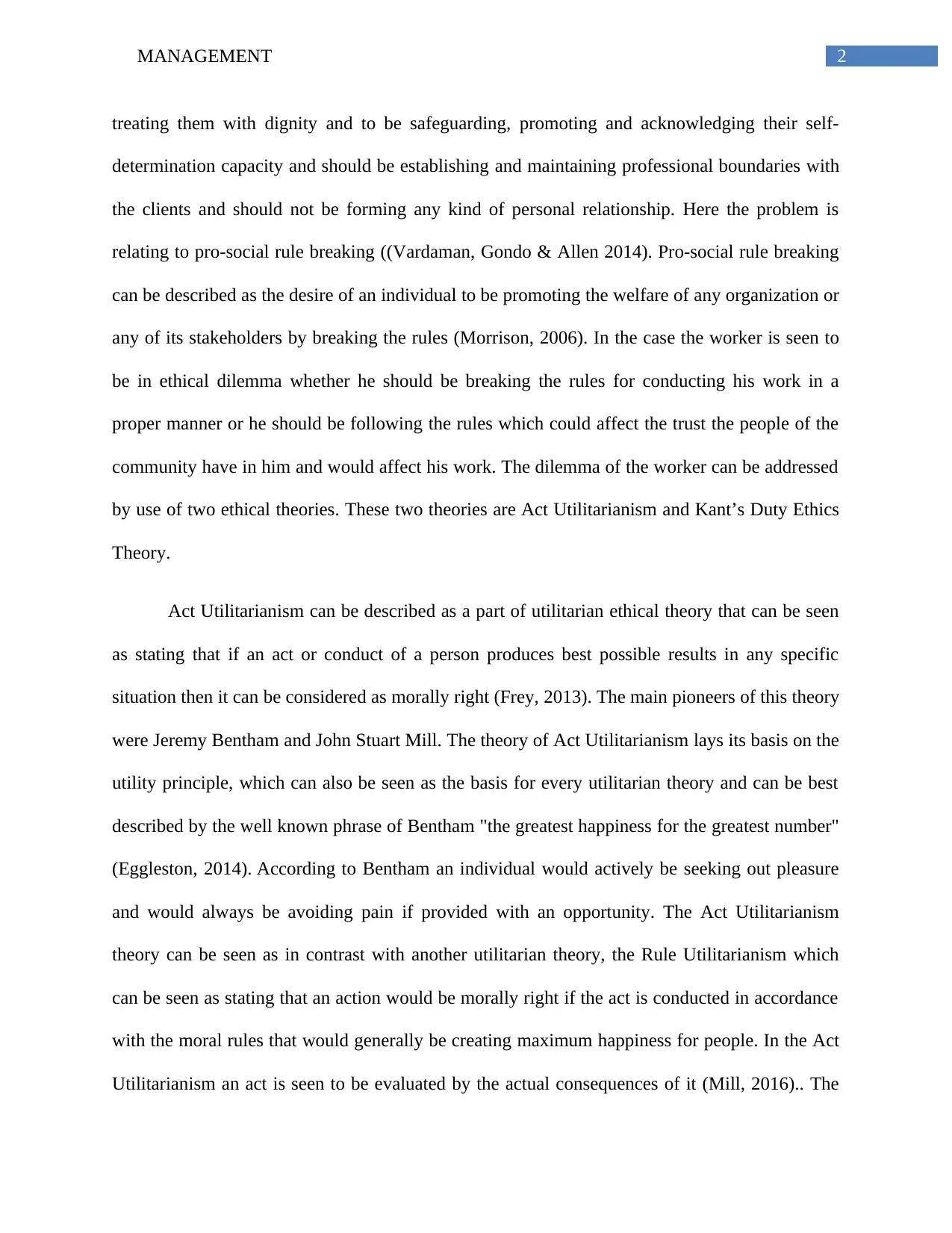
2MANAGEMENT
treating them with dignity and to be safeguarding, promoting and acknowledging their self-
determination capacity and should be establishing and maintaining professional boundaries with
the clients and should not be forming any kind of personal relationship. Here the problem is
relating to pro-social rule breaking ((Vardaman, Gondo & Allen 2014). Pro-social rule breaking
can be described as the desire of an individual to be promoting the welfare of any organization or
any of its stakeholders by breaking the rules (Morrison, 2006). In the case the worker is seen to
be in ethical dilemma whether he should be breaking the rules for conducting his work in a
proper manner or he should be following the rules which could affect the trust the people of the
community have in him and would affect his work. The dilemma of the worker can be addressed
by use of two ethical theories. These two theories are Act Utilitarianism and Kant’s Duty Ethics
Theory.
Act Utilitarianism can be described as a part of utilitarian ethical theory that can be seen
as stating that if an act or conduct of a person produces best possible results in any specific
situation then it can be considered as morally right (Frey, 2013). The main pioneers of this theory
were Jeremy Bentham and John Stuart Mill. The theory of Act Utilitarianism lays its basis on the
utility principle, which can also be seen as the basis for every utilitarian theory and can be best
described by the well known phrase of Bentham "the greatest happiness for the greatest number"
(Eggleston, 2014). According to Bentham an individual would actively be seeking out pleasure
and would always be avoiding pain if provided with an opportunity. The Act Utilitarianism
theory can be seen as in contrast with another utilitarian theory, the Rule Utilitarianism which
can be seen as stating that an action would be morally right if the act is conducted in accordance
with the moral rules that would generally be creating maximum happiness for people. In the Act
Utilitarianism an act is seen to be evaluated by the actual consequences of it (Mill, 2016).. The
treating them with dignity and to be safeguarding, promoting and acknowledging their self-
determination capacity and should be establishing and maintaining professional boundaries with
the clients and should not be forming any kind of personal relationship. Here the problem is
relating to pro-social rule breaking ((Vardaman, Gondo & Allen 2014). Pro-social rule breaking
can be described as the desire of an individual to be promoting the welfare of any organization or
any of its stakeholders by breaking the rules (Morrison, 2006). In the case the worker is seen to
be in ethical dilemma whether he should be breaking the rules for conducting his work in a
proper manner or he should be following the rules which could affect the trust the people of the
community have in him and would affect his work. The dilemma of the worker can be addressed
by use of two ethical theories. These two theories are Act Utilitarianism and Kant’s Duty Ethics
Theory.
Act Utilitarianism can be described as a part of utilitarian ethical theory that can be seen
as stating that if an act or conduct of a person produces best possible results in any specific
situation then it can be considered as morally right (Frey, 2013). The main pioneers of this theory
were Jeremy Bentham and John Stuart Mill. The theory of Act Utilitarianism lays its basis on the
utility principle, which can also be seen as the basis for every utilitarian theory and can be best
described by the well known phrase of Bentham "the greatest happiness for the greatest number"
(Eggleston, 2014). According to Bentham an individual would actively be seeking out pleasure
and would always be avoiding pain if provided with an opportunity. The Act Utilitarianism
theory can be seen as in contrast with another utilitarian theory, the Rule Utilitarianism which
can be seen as stating that an action would be morally right if the act is conducted in accordance
with the moral rules that would generally be creating maximum happiness for people. In the Act
Utilitarianism an act is seen to be evaluated by the actual consequences of it (Mill, 2016).. The
⊘ This is a preview!⊘
Do you want full access?
Subscribe today to unlock all pages.

Trusted by 1+ million students worldwide
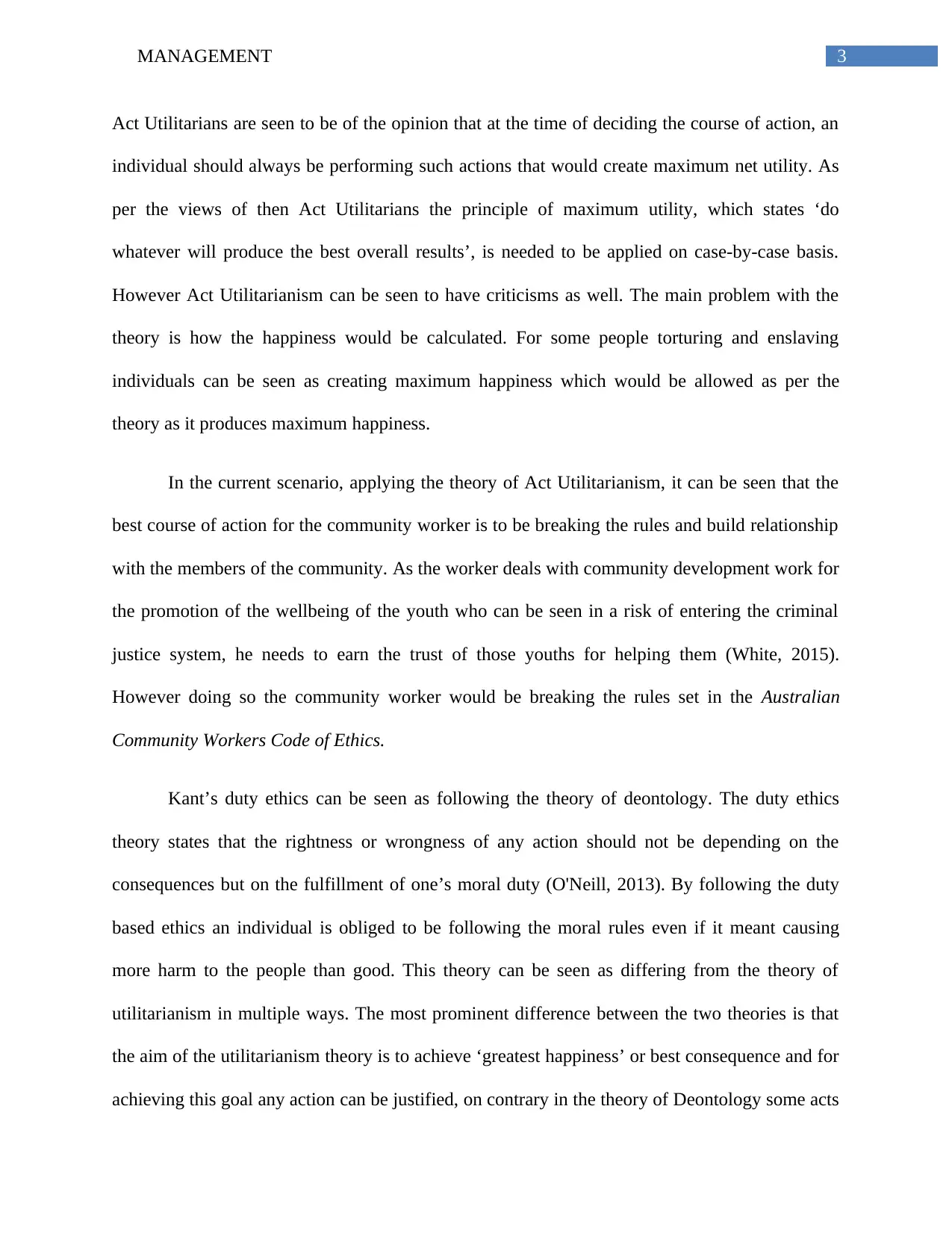
3MANAGEMENT
Act Utilitarians are seen to be of the opinion that at the time of deciding the course of action, an
individual should always be performing such actions that would create maximum net utility. As
per the views of then Act Utilitarians the principle of maximum utility, which states ‘do
whatever will produce the best overall results’, is needed to be applied on case-by-case basis.
However Act Utilitarianism can be seen to have criticisms as well. The main problem with the
theory is how the happiness would be calculated. For some people torturing and enslaving
individuals can be seen as creating maximum happiness which would be allowed as per the
theory as it produces maximum happiness.
In the current scenario, applying the theory of Act Utilitarianism, it can be seen that the
best course of action for the community worker is to be breaking the rules and build relationship
with the members of the community. As the worker deals with community development work for
the promotion of the wellbeing of the youth who can be seen in a risk of entering the criminal
justice system, he needs to earn the trust of those youths for helping them (White, 2015).
However doing so the community worker would be breaking the rules set in the Australian
Community Workers Code of Ethics.
Kant’s duty ethics can be seen as following the theory of deontology. The duty ethics
theory states that the rightness or wrongness of any action should not be depending on the
consequences but on the fulfillment of one’s moral duty (O'Neill, 2013). By following the duty
based ethics an individual is obliged to be following the moral rules even if it meant causing
more harm to the people than good. This theory can be seen as differing from the theory of
utilitarianism in multiple ways. The most prominent difference between the two theories is that
the aim of the utilitarianism theory is to achieve ‘greatest happiness’ or best consequence and for
achieving this goal any action can be justified, on contrary in the theory of Deontology some acts
Act Utilitarians are seen to be of the opinion that at the time of deciding the course of action, an
individual should always be performing such actions that would create maximum net utility. As
per the views of then Act Utilitarians the principle of maximum utility, which states ‘do
whatever will produce the best overall results’, is needed to be applied on case-by-case basis.
However Act Utilitarianism can be seen to have criticisms as well. The main problem with the
theory is how the happiness would be calculated. For some people torturing and enslaving
individuals can be seen as creating maximum happiness which would be allowed as per the
theory as it produces maximum happiness.
In the current scenario, applying the theory of Act Utilitarianism, it can be seen that the
best course of action for the community worker is to be breaking the rules and build relationship
with the members of the community. As the worker deals with community development work for
the promotion of the wellbeing of the youth who can be seen in a risk of entering the criminal
justice system, he needs to earn the trust of those youths for helping them (White, 2015).
However doing so the community worker would be breaking the rules set in the Australian
Community Workers Code of Ethics.
Kant’s duty ethics can be seen as following the theory of deontology. The duty ethics
theory states that the rightness or wrongness of any action should not be depending on the
consequences but on the fulfillment of one’s moral duty (O'Neill, 2013). By following the duty
based ethics an individual is obliged to be following the moral rules even if it meant causing
more harm to the people than good. This theory can be seen as differing from the theory of
utilitarianism in multiple ways. The most prominent difference between the two theories is that
the aim of the utilitarianism theory is to achieve ‘greatest happiness’ or best consequence and for
achieving this goal any action can be justified, on contrary in the theory of Deontology some acts
Paraphrase This Document
Need a fresh take? Get an instant paraphrase of this document with our AI Paraphraser
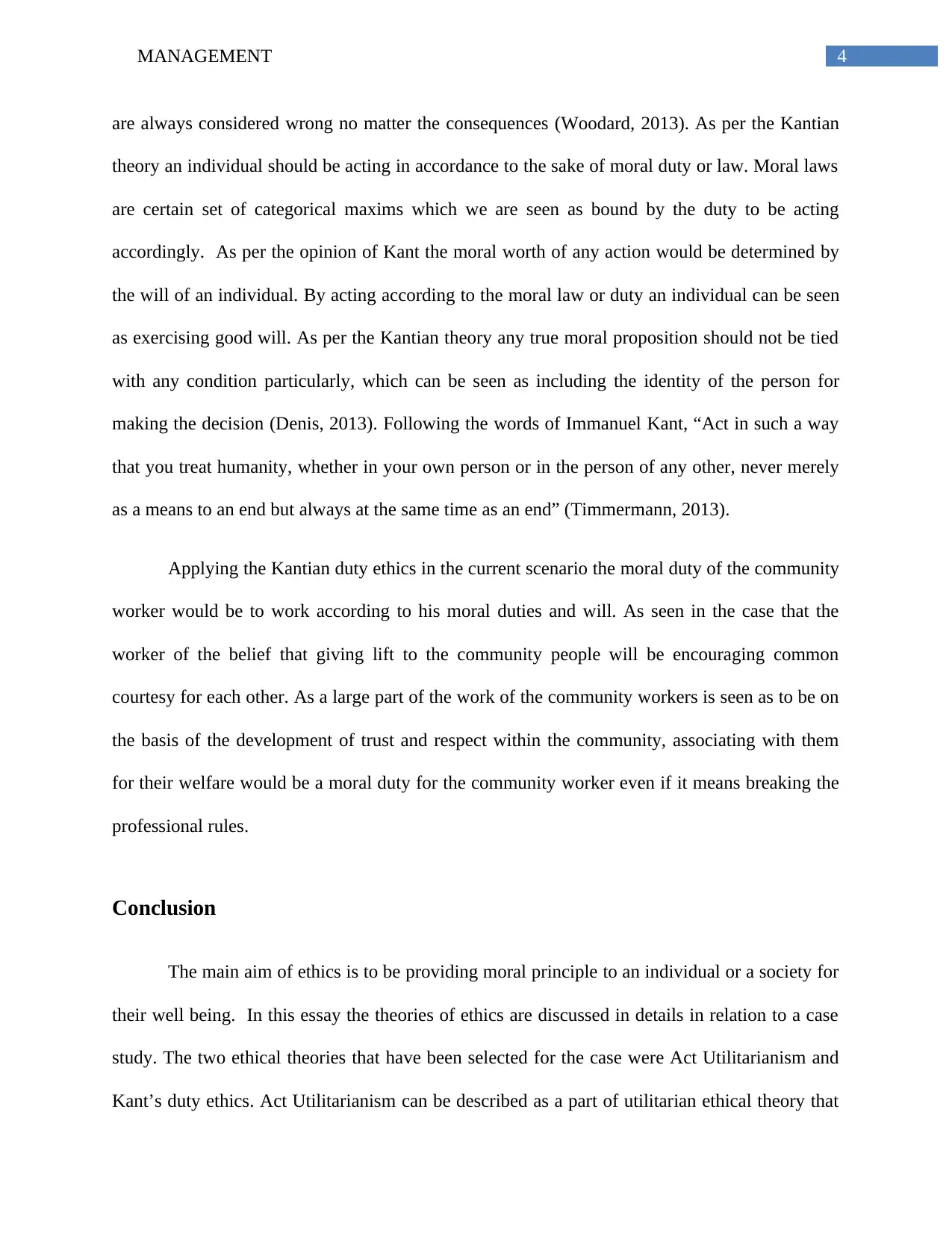
4MANAGEMENT
are always considered wrong no matter the consequences (Woodard, 2013). As per the Kantian
theory an individual should be acting in accordance to the sake of moral duty or law. Moral laws
are certain set of categorical maxims which we are seen as bound by the duty to be acting
accordingly. As per the opinion of Kant the moral worth of any action would be determined by
the will of an individual. By acting according to the moral law or duty an individual can be seen
as exercising good will. As per the Kantian theory any true moral proposition should not be tied
with any condition particularly, which can be seen as including the identity of the person for
making the decision (Denis, 2013). Following the words of Immanuel Kant, “Act in such a way
that you treat humanity, whether in your own person or in the person of any other, never merely
as a means to an end but always at the same time as an end” (Timmermann, 2013).
Applying the Kantian duty ethics in the current scenario the moral duty of the community
worker would be to work according to his moral duties and will. As seen in the case that the
worker of the belief that giving lift to the community people will be encouraging common
courtesy for each other. As a large part of the work of the community workers is seen as to be on
the basis of the development of trust and respect within the community, associating with them
for their welfare would be a moral duty for the community worker even if it means breaking the
professional rules.
Conclusion
The main aim of ethics is to be providing moral principle to an individual or a society for
their well being. In this essay the theories of ethics are discussed in details in relation to a case
study. The two ethical theories that have been selected for the case were Act Utilitarianism and
Kant’s duty ethics. Act Utilitarianism can be described as a part of utilitarian ethical theory that
are always considered wrong no matter the consequences (Woodard, 2013). As per the Kantian
theory an individual should be acting in accordance to the sake of moral duty or law. Moral laws
are certain set of categorical maxims which we are seen as bound by the duty to be acting
accordingly. As per the opinion of Kant the moral worth of any action would be determined by
the will of an individual. By acting according to the moral law or duty an individual can be seen
as exercising good will. As per the Kantian theory any true moral proposition should not be tied
with any condition particularly, which can be seen as including the identity of the person for
making the decision (Denis, 2013). Following the words of Immanuel Kant, “Act in such a way
that you treat humanity, whether in your own person or in the person of any other, never merely
as a means to an end but always at the same time as an end” (Timmermann, 2013).
Applying the Kantian duty ethics in the current scenario the moral duty of the community
worker would be to work according to his moral duties and will. As seen in the case that the
worker of the belief that giving lift to the community people will be encouraging common
courtesy for each other. As a large part of the work of the community workers is seen as to be on
the basis of the development of trust and respect within the community, associating with them
for their welfare would be a moral duty for the community worker even if it means breaking the
professional rules.
Conclusion
The main aim of ethics is to be providing moral principle to an individual or a society for
their well being. In this essay the theories of ethics are discussed in details in relation to a case
study. The two ethical theories that have been selected for the case were Act Utilitarianism and
Kant’s duty ethics. Act Utilitarianism can be described as a part of utilitarian ethical theory that
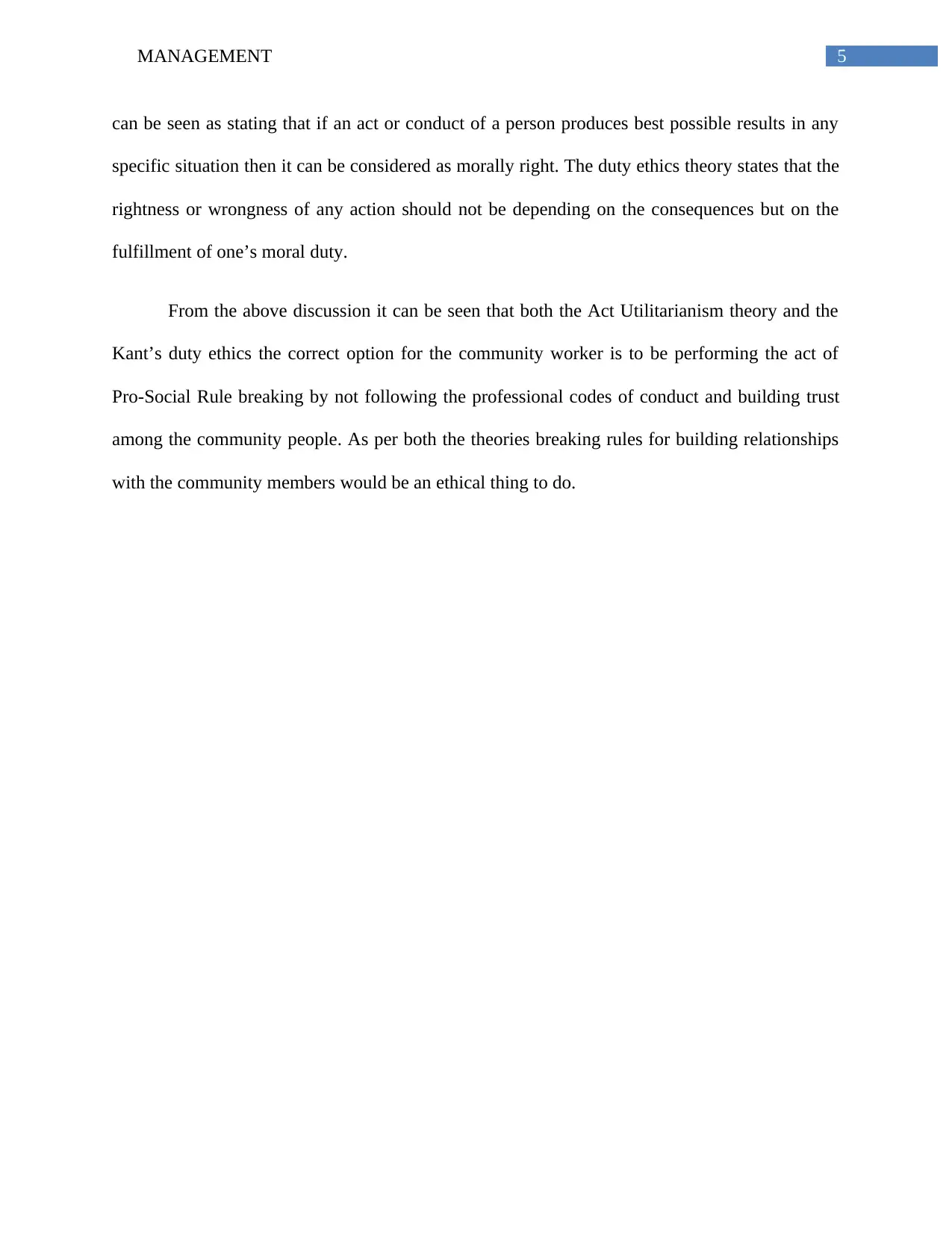
5MANAGEMENT
can be seen as stating that if an act or conduct of a person produces best possible results in any
specific situation then it can be considered as morally right. The duty ethics theory states that the
rightness or wrongness of any action should not be depending on the consequences but on the
fulfillment of one’s moral duty.
From the above discussion it can be seen that both the Act Utilitarianism theory and the
Kant’s duty ethics the correct option for the community worker is to be performing the act of
Pro-Social Rule breaking by not following the professional codes of conduct and building trust
among the community people. As per both the theories breaking rules for building relationships
with the community members would be an ethical thing to do.
can be seen as stating that if an act or conduct of a person produces best possible results in any
specific situation then it can be considered as morally right. The duty ethics theory states that the
rightness or wrongness of any action should not be depending on the consequences but on the
fulfillment of one’s moral duty.
From the above discussion it can be seen that both the Act Utilitarianism theory and the
Kant’s duty ethics the correct option for the community worker is to be performing the act of
Pro-Social Rule breaking by not following the professional codes of conduct and building trust
among the community people. As per both the theories breaking rules for building relationships
with the community members would be an ethical thing to do.
⊘ This is a preview!⊘
Do you want full access?
Subscribe today to unlock all pages.

Trusted by 1+ million students worldwide
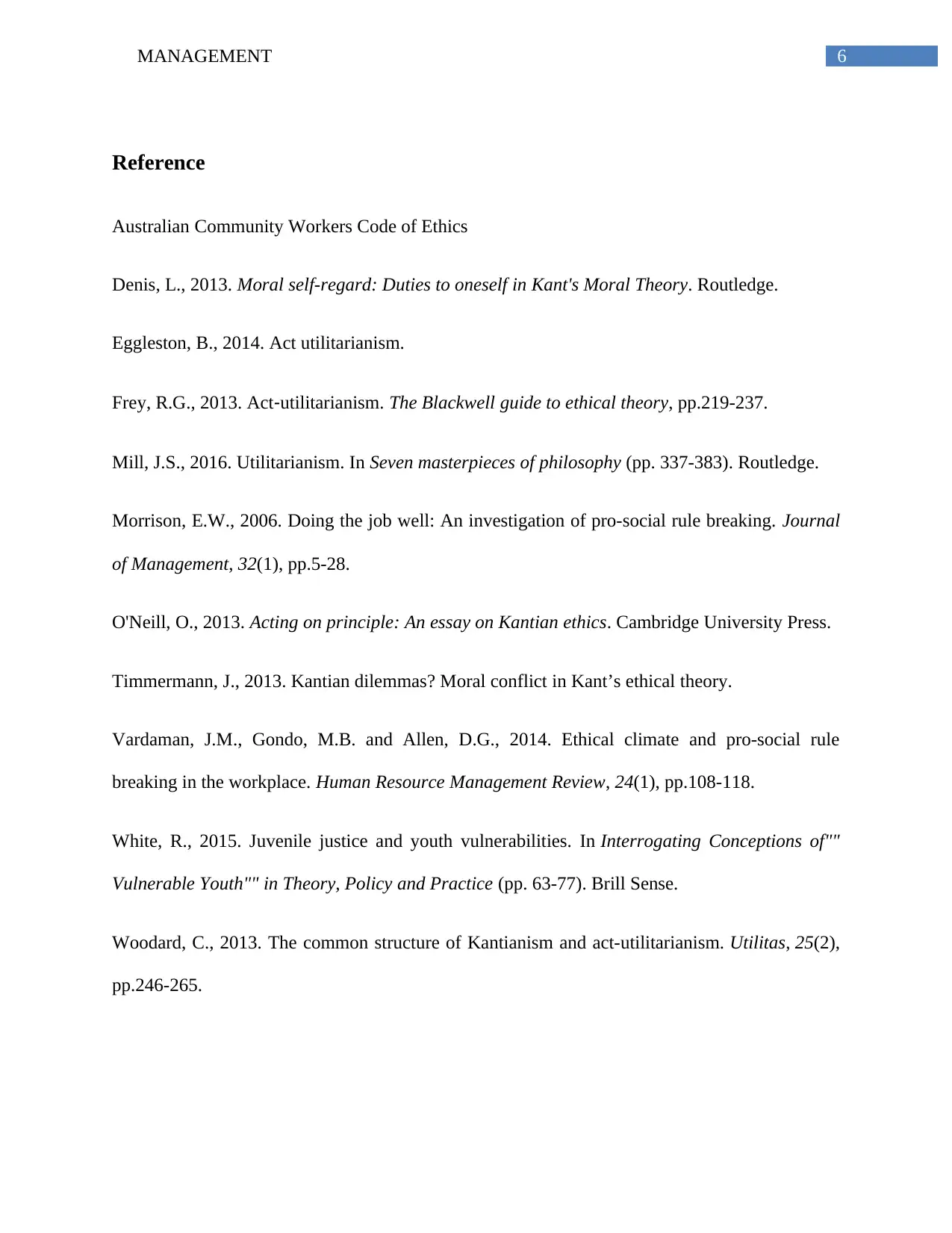
6MANAGEMENT
Reference
Australian Community Workers Code of Ethics
Denis, L., 2013. Moral self-regard: Duties to oneself in Kant's Moral Theory. Routledge.
Eggleston, B., 2014. Act utilitarianism.
Frey, R.G., 2013. Act‐utilitarianism. The Blackwell guide to ethical theory, pp.219-237.
Mill, J.S., 2016. Utilitarianism. In Seven masterpieces of philosophy (pp. 337-383). Routledge.
Morrison, E.W., 2006. Doing the job well: An investigation of pro-social rule breaking. Journal
of Management, 32(1), pp.5-28.
O'Neill, O., 2013. Acting on principle: An essay on Kantian ethics. Cambridge University Press.
Timmermann, J., 2013. Kantian dilemmas? Moral conflict in Kant’s ethical theory.
Vardaman, J.M., Gondo, M.B. and Allen, D.G., 2014. Ethical climate and pro-social rule
breaking in the workplace. Human Resource Management Review, 24(1), pp.108-118.
White, R., 2015. Juvenile justice and youth vulnerabilities. In Interrogating Conceptions of""
Vulnerable Youth"" in Theory, Policy and Practice (pp. 63-77). Brill Sense.
Woodard, C., 2013. The common structure of Kantianism and act-utilitarianism. Utilitas, 25(2),
pp.246-265.
Reference
Australian Community Workers Code of Ethics
Denis, L., 2013. Moral self-regard: Duties to oneself in Kant's Moral Theory. Routledge.
Eggleston, B., 2014. Act utilitarianism.
Frey, R.G., 2013. Act‐utilitarianism. The Blackwell guide to ethical theory, pp.219-237.
Mill, J.S., 2016. Utilitarianism. In Seven masterpieces of philosophy (pp. 337-383). Routledge.
Morrison, E.W., 2006. Doing the job well: An investigation of pro-social rule breaking. Journal
of Management, 32(1), pp.5-28.
O'Neill, O., 2013. Acting on principle: An essay on Kantian ethics. Cambridge University Press.
Timmermann, J., 2013. Kantian dilemmas? Moral conflict in Kant’s ethical theory.
Vardaman, J.M., Gondo, M.B. and Allen, D.G., 2014. Ethical climate and pro-social rule
breaking in the workplace. Human Resource Management Review, 24(1), pp.108-118.
White, R., 2015. Juvenile justice and youth vulnerabilities. In Interrogating Conceptions of""
Vulnerable Youth"" in Theory, Policy and Practice (pp. 63-77). Brill Sense.
Woodard, C., 2013. The common structure of Kantianism and act-utilitarianism. Utilitas, 25(2),
pp.246-265.
1 out of 7
Related Documents
Your All-in-One AI-Powered Toolkit for Academic Success.
+13062052269
info@desklib.com
Available 24*7 on WhatsApp / Email
![[object Object]](/_next/static/media/star-bottom.7253800d.svg)
Unlock your academic potential
Copyright © 2020–2026 A2Z Services. All Rights Reserved. Developed and managed by ZUCOL.





